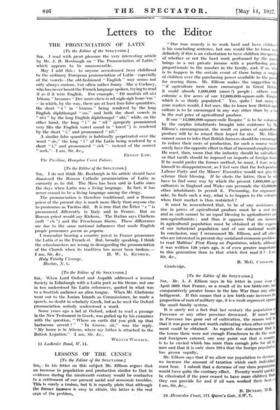LESSONS OF THE CENSUS [To the Editor of the SPECTATOR.]
SIR,—In his letter on this subject Mr. Ellison argues that an increase in population and production similar to that in evidence during the nineteenth century would be conducive to a settlement of our present social and economic troubles. This is surely a truism, but it.is equally plain that although the former lgosease is easy to attain, the latter Is- the -real crux of the problem.
" Our true remedy is to work hard and have children' is his concluding sentence, but one would like to know moil definitely if this is an exhortation to have children irrespective of whether or not the hard work performed by the pares brings in a net private income with a purchasing pore, proportionate to the number in the family, and, if so, Opal is to happen in the certain event of there being a surplue of children over the purchasing power available to the pareni for rearing them. Mr. Ellison makes the suggestion that " if agriculture were more encouraged in Great Britair, it could absorb 1,000,000 (more ?) people ; others court colonize a few acres of our 12,000,000-square-mile Empire, which is so thinly populated." Yes, quite ! but many of your readers would, I feel sure, like to know how British agri• culture is to be encouraged in any way other than by a rhe in the real price of agricultural produce.
If our " 12,000,000-square-mile Empire " is to be colonized by the surplus inhabitants brought into existence by Mr, Ellison's encouragement, the result on prices of agricultural produce will be to retard their hoped for rise. Mr. Ellison cannot mean to infer that British farmers should be encouraged to reduce their costs of production, for such a course would surely have the opposite effect to that of increased employment. He must, then, mean that the industry should be subsidized. or that tariffs should be imposed on imports of foreign food,. If he would prefer the former method, lie must, I fear, resign himself to disappointment, as I feel sure that the Independent Labour Party and the Miners' Executive would not give the scheme their blessing. If he elects the latter, then he iii have to find some way by which the present 1,000,000 agri culturists in England and Wales can persuade the 35,000,00n other inhabitants to permit it. Presuming, for argument% sake, he finds such a way, what is to happen to the colonists when their market is thus restricted ?
• It must be remembered that, to be of any assistance, a rise in prices of agricultural produce must be a real rise, and as such cannot be an equal blessing to agriculturists and non-agriculturists ; and thus it appears that an increase in agricultural population must be obtained at the expense of our industrial population and of our national wealth. In conclusion, may I recommend Mr. Ellison, and all other who are interested in present-day social and economic problem. to read Malthus' First Essay on Population, which, although it was written 128 years ago, is of even greater importance to this generation than to that which first read it
Sir, &c.,


























































 Previous page
Previous page